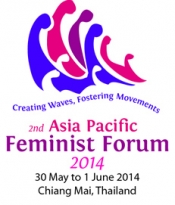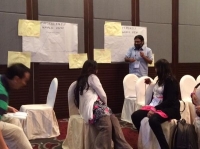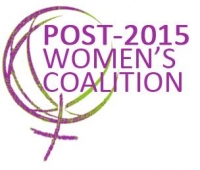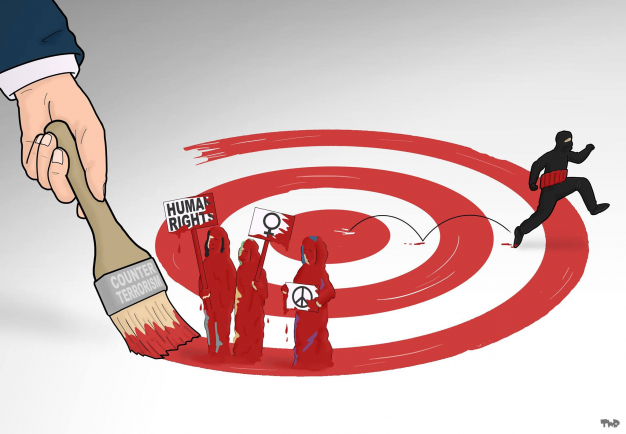The following blog is based on meeting notes by the Post 2015 Coalition  During the Asia Pacific Feminist Forum (May 30- June 1, Chang Mai, Thailand), the Post 2015 Women’s Coalition organized the workshop “Tackling Key Structural Factors for Feminist Movement Building across Regions”. On behalf of the Women Peacemakers Program (WPP), Anand Pawar, member of the WPP Asia Board and Executive Director of SAMYAK, participated as one of the speakers of the workshop.
During the Asia Pacific Feminist Forum (May 30- June 1, Chang Mai, Thailand), the Post 2015 Women’s Coalition organized the workshop “Tackling Key Structural Factors for Feminist Movement Building across Regions”. On behalf of the Women Peacemakers Program (WPP), Anand Pawar, member of the WPP Asia Board and Executive Director of SAMYAK, participated as one of the speakers of the workshop.
Other speakers of the workshop were representatives of the Centre for Women’s Leadership; Programme on Women’s Economic Social and Cultural Rights (PWESCR); Equidad de Genero: Ciudadania, Trabajo y Familia; and the youth branch of the Women’s International League for Peace & Freedom (Y-WILPF).
The workshop focused on two main themes: 1) the transformative capacities of UN Security Council Resolution (UNSCR) 1325; and 2) macro-economics thinking about women as economic agents. Within the first theme, questions were raised whether the current application of UNSCR 1325, which centers on representations (or ‘women at the table’), women within the military and making the military accessible to women, is utilizing the full potential of UNSCR 1325 and Women Peace and Security (WPS) frameworks as a demilitarisation tool. Anand Pawar spoke about the connections between hegemonic masculinities, violence and militarism, and using a masculinities perspective for advancing UNSCR 1325 implementation. He advocated for changing the masculine military and economic system, adjunct to including women within the existing system.
Within the first theme, questions were raised whether the current application of UNSCR 1325, which centers on representations (or ‘women at the table’), women within the military and making the military accessible to women, is utilizing the full potential of UNSCR 1325 and Women Peace and Security (WPS) frameworks as a demilitarisation tool. Anand Pawar spoke about the connections between hegemonic masculinities, violence and militarism, and using a masculinities perspective for advancing UNSCR 1325 implementation. He advocated for changing the masculine military and economic system, adjunct to including women within the existing system.
In regards to the second theme, speakers emphasized the need for a paradigm shift – seeing women rather as active economic agents instead of victims that need protection. It is not just about placing women in income generating activities in current economic systems, it requires an overall paradigm shift. This section had an ‘Economics, Social and Cultural Rights’ (ESCR) focus as a way to challenge structural inequalities that result in gender (and other) inequalities.
Within the discussion, the context and the structural issues of women in the Asia region were highlighted, including the following topics:
Next to the structural issues, several obstacles were discussed. Amongst others, the problem of the perception of women as victims, instead of active agents, was raised. Linked to this is the problem of the economic development models that do not address structural inequalities. Another obstacle was the threats (women’s) human rights defenders have to face.
At the end of the workshop, strategies for moving forward were also discussed. The focus of these strategies lay on the “universal but not uniform” approach. Through this approach the same goals can be reached, but it allows for the means to be situation specific. One suggestion was to incorporate a holistic analysis, in order to be better equipped to address women's issues, such as militarism, disarmament, and security. In addition, it was advised to invest in trainings covering multiple international tools and legislation – UNSCR 1325, CEDAW, ESCR etc – in order not to be dependent on one tool and to diversify strategies.
 WPP specifically thanks the Post 2015 Women's Coalition for enabling the participation of WPP Asia Board Member Anand Pawar in this workshop.
WPP specifically thanks the Post 2015 Women's Coalition for enabling the participation of WPP Asia Board Member Anand Pawar in this workshop.
The Post 2015 Women’s Coalition is an international network of feminist, women’s rights, women’s development, grassroots and social justice organizations working, through advocacy and movement building, to challenge and reframe the global development agenda.
Read more about the work of the Post 2015 Women's Coalition and the importance of including a women's perspective in the post 2015 development process here:
www.post2015women.com
More information about the Asia Pacific Feminist Forum can be found here:
apwld.org/apfeministforum/
11 Dec '17 This month WPP staff interviewed Arbia Jebali and Sarah Chamekh from Free Sight Association in Tunisia about the work their organization does, how civil society space has changed over the years, which challenges they are facing now, and how civil society in Tunisia is organizing itself to overcome those challenges.
7 Nov '17 In this article, WPP staff interviewed Doron Joles of XminY Fund, an activist organization that supports social movements, action groups and changemakers fighting for a fair, democratic, sustainable and accepting world. He discusses the unique way they have chosen to hand out funds, and the challenges that go along with funding small activist organizations in the current global climate.

25 Oct '17 This Friday, the UNSCR 1325 Open Debate will take place once again, seventeen years since the adoption of landmark UN Security Council Resolution 1325 on Women, Peace and Security. In this article WPP staff reflects on the progress made for a truly transformative feminist peace agenda until now.
